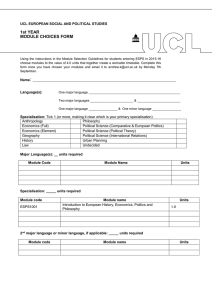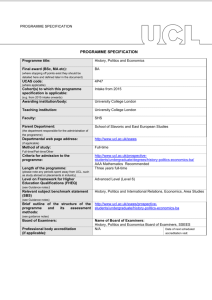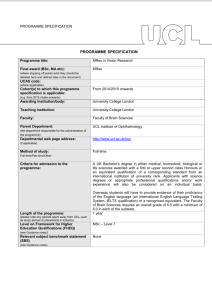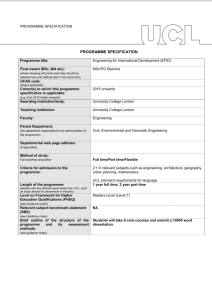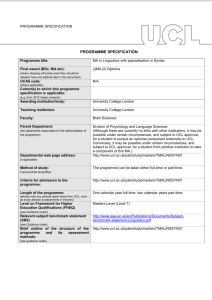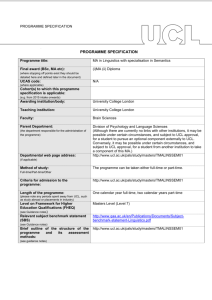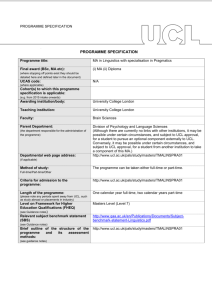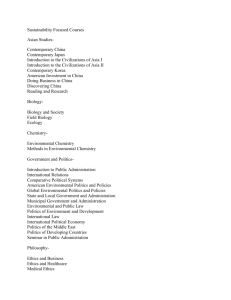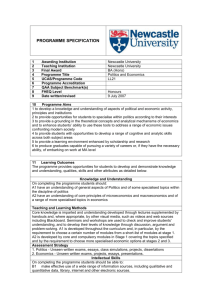BSc Philosophy, Politics and Economics
advertisement
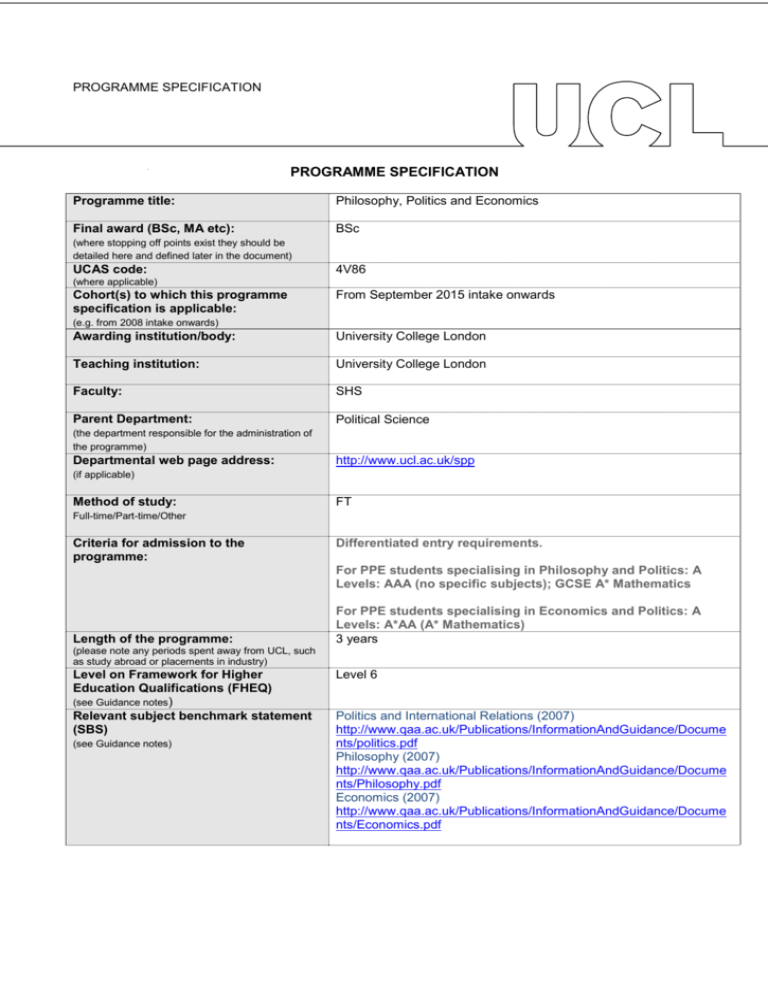
PROGRAMME SPECIFICATION PROGRAMME SPECIFICATION Programme title: Philosophy, Politics and Economics Final award (BSc, MA etc): BSc (where stopping off points exist they should be detailed here and defined later in the document) UCAS code: 4V86 (where applicable) Cohort(s) to which this programme specification is applicable: From September 2015 intake onwards (e.g. from 2008 intake onwards) Awarding institution/body: University College London Teaching institution: University College London Faculty: SHS Parent Department: Political Science (the department responsible for the administration of the programme) Departmental web page address: http://www.ucl.ac.uk/spp (if applicable) Method of study: FT Full-time/Part-time/Other Criteria for admission to the programme: Differentiated entry requirements. For PPE students specialising in Philosophy and Politics: A Levels: AAA (no specific subjects); GCSE A* Mathematics Length of the programme: For PPE students specialising in Economics and Politics: A Levels: A*AA (A* Mathematics) 3 years (please note any periods spent away from UCL, such as study abroad or placements in industry) Level on Framework for Higher Education Qualifications (FHEQ) (see Guidance notes) Relevant subject benchmark statement (SBS) (see Guidance notes) Level 6 Politics and International Relations (2007) http://www.qaa.ac.uk/Publications/InformationAndGuidance/Docume nts/politics.pdf Philosophy (2007) http://www.qaa.ac.uk/Publications/InformationAndGuidance/Docume nts/Philosophy.pdf Economics (2007) http://www.qaa.ac.uk/Publications/InformationAndGuidance/Docume nts/Economics.pdf Brief outline of the structure of the programme and its assessment methods: (see guidance notes) Year 1 Introductory modules in 3 disciplines and in methods Year 2 Disciplinary core in two of three disciplines and methods Year 3 Disciplinary options, multidiscipline capstone policy module, dissertation, and methods. Board of Examiners: Year 2 transfer option for students wishing to pursue Philosophy and Economics BA i) Name of Board of Examiners: Board of Examiners of the BSc Philosophy Politics and Economics Professional body accreditation (if applicable): NA Date of next scheduled accreditation visit: EDUCATIONAL AIMS OF THE PROGRAMME: The BSc in Philosophy Politics and Economics, drawing on multiple lines of inquiry, aims to provide breadth and depth in understanding social and political phenomena and the principles informing and the consequences following from policy choices. The course exposes students to the modes of reasoning and types of evidence used by the three disciplines, a concentration in two disciplines, and case examples of the contributions of a multidisciplinary approach to complex problems. It combines an education in social sciences and philosophy with a sustained and comprehensive treatment of the methods of social and normative inquiry. PROGRAMME OUTCOMES: Drawing on the teaching resources and experience of the three departments, the expected outcome is well-trained and substantively informed graduates with analytical and methodological skills appropriate to understand social and political contexts, complex problems and policy-making. The programme provides opportunities for students to develop and demonstrate knowledge and understanding, qualities, skills and other attributes in the following areas: A: Knowledge and understanding Knowledge and understanding of: 1. The modes of inquiry of the three disciplines, the types of questions asked, and the evidence and reasoning that characterises the study of philosophical issues and political and economic phenomena. 2. Core concepts, theories and analytical issues that inform disciplinary understanding and how to apply concepts and theories to the study of economic and political phenomena. 3. The role and significance of both empirical and normative questions in the study of society and collective decision making. Teaching/learning methods and strategies: The course addresses (1) with core 1 hour lectures and seminars and (2) and (3) through both required and optional courses which permit a particular substantive and policy focus and treatment of related empirical, normative and analytical components. The first year provides a broad grounding across the three disciplines. Yr 2 introduces the core disciplinary modules and Yr 3 the optional, independent research and policy focus. The capstone global policy module provides an applied problem setting to acquire this knowledge. It demonstrates the various contributions of the three disciplines to understanding complex policy problems. Assessment: Assessment includes essays, exams and an independent research project or dissertation. Graded coursework and comments prepare the students for the dissertation and independent research projects. The longer essay in the capstone global policy module and accompany feedback allows students to understand the importance of both empirical and normative issues in developing solutions to complex policy problems. B: Skills and other attributes Intellectual (thinking) skills: 1. Collect classify and compare information from different sources 2. Identify the nature of the questions raised, identify strengths and weaknesses of different approaches to research questions and policy problems 3. Understand the advantages of different methods and issues of replication and generalisation. 4. Summarise philosophical economic and political positions and perspectives. 5. Construct reasoned and evidence-based arguments. Teaching/learning methods and strategies: All modules in the programme will contribute to the acquisition of these skills. Assumptions, the development of arguments and models, and the quality of evidence are treated throughout the curriculum. The reading, the course work and the feedback and seminar participation help students develop these skills. The range of methods in the methods sequence will give students an appreciation of the trade-offs between different approaches and how to match theoretical statements with appropriate evidence. Assessment: Assessment includes essays, exams and an independent research project or dissertation. C: Skills and other attributes Practical skills (able to): 1. Formulating well-organised written and oral presentation of results and arguments. 2. Formulating and debating contested issues and concepts in seminars 3. Quantitative and qualitative data collection, management and analysis 4. Hypothesis formulation and testing. 5. Familiarity with data and software for accessing and analysing data. Teaching/learning methods and strategies: Most modules require essays and seminar participation which provide opportunities to present findings to the group. The methods modules sequence will systematically introduce students to data collection and analysis. Quantitative data is now widely available in political science and economics and students will be exposed to the use and analysis of real data and to replication exercises. Assessment: Assessment includes essays, exams and an independent research project or dissertation. The dissertation/research project will permit students to demonstrate the methods skills acquired and applied to a specific research question. D: Skills and other attributes Transferable skills (able to): 1. Effective written and oral communication 2. Use information technology for presentation of information, including, where appropriate, statistical or numerical information. 3. Acquire information from documentary and library sources and assess books and articles. 4. Work independently and budget time appropriately to meet deadlines and accomplish tasks. 5. Collaborate with others to achieve common goals through, for example, group work and group presentations in seminars Teaching/learning methods and strategies: All modules will contribute to the acquisition of these skills and the methods sequence will provide extensive exposure to effective presentation of information. Modules come with extensive course outlines and reading lists the discussion of which is normally integrated into seminar participation and assessment. Assessment: Assessment includes essays, exams and an independent research project or dissertation. Graded coursework and feedback normally requires evidence of effective engagement with the relevant literature. The following reference points were used in designing the programme: the Framework for Higher Education Qualifications: (http://www.qaa.ac.uk/en/Publications/Documents/Framework-Higher-Education-Qualifications-08.pdf); the relevant Subject Benchmark Statements: (http://www.qaa.ac.uk/assuring-standards-and-quality/the-quality-code/subject-benchmark-statements); the programme specifications for UCL degree programmes in relevant subjects (where applicable); UCL teaching and learning policies; staff research. Please note: This specification provides a concise summary of the main features of the programme and the learning outcomes that a typical student might reasonably be expected to achieve and demonstrate if he/she takes full advantage of the learning opportunities that are provided. More detailed information on the learning outcomes, content and teaching, learning and assessment methods of each course unit/module can be found in the departmental course handbook. The accuracy of the information contained in this document is reviewed annually by UCL and may be checked by the Quality Assurance Agency. Programme Organiser(s) Tim Hicks Name(s): Date of Production: November 2013 Date of Review: December 2014 Date approved by Head of Department: December 2014 Date approved by Chair of Departmental Teaching Committee: Date approved by Faculty Teaching Committee December 2014 January 2015
